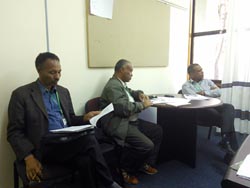Endalkachew wolde-Meskel chose to repeat the Ethiopian part of the article on the PPP, from Podcaster 29 (January and February 2015), as the PPP was a useful approach that N2Africa followed to promote the dissemination of legume technology and value chain in Ethiopia. Mapping relevant stakeholders and functionalizing the PPP at the different corners of the country, we were able to reach more than 50,000 of smallholders, made possible smallholders access to inoculants - an essential element of the N2Africa legume production technology. The popularity of inoculants with smallholders in Ethiopia has increased 14-fold, just in the last 4 years. The PPPs approach was also useful vehicle to access grain market for the smallholders and I hope it will remain as a useful footprint of N2Africa project in the future.
Moving on from a "proof of concept" during the first phase of the N2Africa approach at scale, the second phase was designed to scale out the proven legume technologies using a "business led" approach.
Special credit on spear-heading comprehensive partnerships is given to Ethiopia. A good example is the multi-partners, comprehensive ‘Balegreen Spice and Grain Development Plc’ partnership.
|
Balegreen Spice and Grain Development Plc
Balegreen Spice and Grain Development Plc is a a nucleus farm involved in both their own and community seed multiplication, in dissemination, bulking, mechanization services, fertilizer and inoculant supply to out-growers linked to and organized through various Farmers Producers Cooperative Unions covering 90,000 smallholder farmer households. The partnership is further strengthened through an N2Africa solicited USAID funded Alliance for Green Revolution in Africa’s (AGRA) Scaling Seeds and Technologies Partnership (SSTP) project grant of $300,000 to the lead grantee Menagesha Biotech Industry Plc. (MBI), a private sector inoculant manufacturer. The project is entitled “Scaling Chickpea Technologies for Increased Production and Productivity of Smallholder Farmers in Major Chickpea Producing Areas of Ethiopia”. It is designed to establish feasible input supply chains and grain market access involving a consortium of Public-Private partners and is part of the larger partnership with Balegreen Spice and Grain Development Plc.
With the grant support from SSTP to the lead grantee Menagesha Biotech Industry Plc. (MBI) and the overall project management by the Steering Committee composed of the key project partners involving N2Africa, MBI, AGRA Ethiopia, Balegreen and Tsehay Union under the chairmanship of -N2Africa, the project will be implemented for 26 months (from February 2015 to April 2017) in the major chickpea growing Woredas of Amhara, Oromiya and SNNPR regions. The partnership is structured under four strategic objectives of supporting chickpea and other legumes input production and distribution, capacity building, partnership development and grain market access. Two seed multiplying partners, Balegreen and Tsehay Union will produce and supply 2,700 tons of certified chickpea seed to the smallholder farmers and the inoculant plant, MBI, will produce and supply over 11 tons of inoculants and provide technical backstopping. By the end of project period the dissemination and commercialization efforts will ensure sustainability of the supply chains. The input distribution channels will use the existing Farmers’ Cooperative Unions to initiate local input dealers. Furthermore, technologies for chickpea and other legumes will be demonstrated to smallholder farmers who will be trained on improved production practices, farming as a business, and linked to high potential and competitive grain buyers mentioned below. This will be achieved through a collaboration among public research and extension organizations (i.e. the National Soil Testing Centre - NSTC and Holeta Agricultural Research Centre-COMPRO II, the Agricultural Transformation Agency- ATA, the National Agricultural Research System entities and the Office of Agriculture for dissemination) and the development partners SNV and Agriterra through their Cooperatives for Change (C4C) project.
The ‘modest’ but crucial role of N2Africa is defined as technical backstopping, soliciting the AGRA grant, coordination of the consortium, facilitation of market linkages, M&E and to provide evidence of the effect of using improved seeds, inoculants and legume (blended) fertilizers. The main project outcomes are increased production, distribution and use of quality Kabuli chickpea and other legumes’ seeds along with inoculants, NPS fertilizer and improved agronomic practices, better coordination, enhanced technical capacity and awareness of farm communities and hence better use and adoption of technologies to enhance production of chickpea and other legumes. Tamiru Amanu, N2Africa Business Development Officer in Ethiopia |



